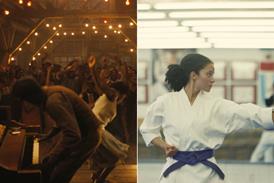Billed as a documentary about 'the coming-out of queer cinema', and destined mostly for TV and DVD formats after further festival action, Here's Looking At You, Boy ticks most of the right boxes in its interviews-plus-film clips survey of the years when queer cinema emerged from the underground into the mainstream.
It takes off, in other words, pretty much where The Celluloid Closet (1995) left off; and in doing so it covers much the same terrain as last year's Fabulous! The Story of Queer Cinema, which also screened at the Berlinale.
The two films even share some of the same interviewees, like the trailblazing John Waters, who provides some of the few laughs in the current opus (on Brokeback Mountain: 'they were distraught because they could only meet twice a year and have great sex' Sounds perfect to me').
But Here's Looking... is a curiously dutiful round-up, without much passion or any discernible agenda. It's also heavily slanted towards US and European gay and lesbian films, with a particular emphasis, in the latter category, on German and Dutch cinema.
This will please the local crowd at the Berlinale, where it played and whose Teddy Awards feature prominently at one point; in fact, the film almost seems tailor-made for this particular festival.
It's odd though, that this instructive tale of how a social minority used cinema as a tool for self-empowerment ignores some important minorities within queer cinema.
Although one or two (Western) interviewees nod at the difficulties of filmmakers in countries where homosexuality is still outlawed or taboo, there is only one interview and filmclip from a developing country - India - and no mention whatsoever of seminal Asian gay films like Zhang Yuan's East Palace, West Palace or Wong Kar-wai's Happy Together.
What we do get are interviews with a string of gay movie alumni or inspirations like Rosa von Praunheim (who looks more and more like Helmut Kohl each year), John Waters, Joseph Lovett, Tilda Swinton, Stephen Frears, Constantinos Giannaris, Guinevere Turner and Gus Van Sant.
Fassbinder and Derek Jarman are commemorated - the latter mostly by his muse, Swinton, who tells a nice anecdote about the way Jarman joked about raising money from producers like Channel 4 or ZDF by telling them that his next project was definitely going to be his last.
It's up to the perceptive Van Sant to point out that one of the reasons why Brokeback Mountain crossed over to mainstream audiences so effectively was because 'just about everyone involved with it was straight'.
Shot on Digi Beta, the film has TV-quality visuals, and Richie Staringer's keyboard soundtrack is too politely jazzy to give much lift. But at least we get to relive some great film moments, from the campfire scene in My Own Private Idaho to the dramatic rooftop revelations in Hettie MacDonald's Beautiful Thing.
Production company
Florianfilm
International sales
SND Films Amsterdam
Producers
Marianne Schafer
Ingmar Trost
Cinematography
Bernd Meiners
Production design
Karsten Binar
Editor
Martin Schomers
Music
Ritchie Staringer




















No comments yet